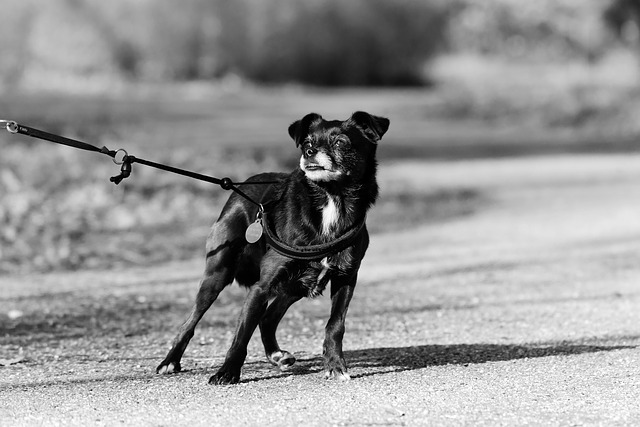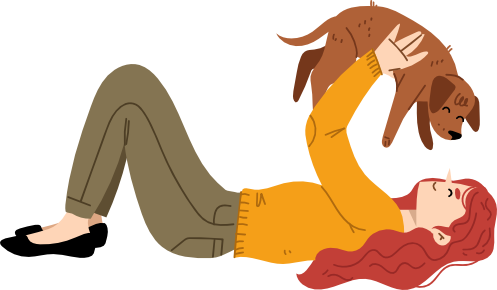If your dog isn’t used to being leashed when you’re out and about, you might run into a conundrum later on – she won’t pee when the leash is attached.
Sure, this isn’t a huge deal when you’re in your backyard. But what if you are on a road trip and can’t find a fenced area to let her roam in? What if you move to an apartment?
It’s pretty important to be able to take your dog outside for a bathroom break wherever you are. Here’s how to teach your dog to pee when she’s attached to a leash, courtesy of our Ask a Behavior Consultant service.
Our reader wrote in to us and asked:
My dog has been an
off leash dog for most of her life. Now, she must be kept onleash , and she won’t go to the bathroom when onleash . How can I teach her it’s ok to go while onleash ?– Sincerely, Sam and Nym
This is a tough problem – but it’s also one that I’ve seen a fair bit of. When we had dogs come into the shelter, some of them wouldn’t walk on a leash or pee if they were attached to one! This, of course, became a problem for their adopters later on.
I can’t tell you exactly why this a problem, but I have a guess: your dog finds being attached to the leash (and in close proximity to you) a bit stressful, and can’t “do the deed” with the added pressure. This is nothing against you – you probably don’t like being watched while you pee, either. But we can fix it!
How to teach your dog to pee when she’s attached to a leash
The simplest solution here is to use a longer leash and more patience. First, get
The lightweight leash will help your dog not feel so dragged down (the sensation on the collar can be part of the problem), and the long distance will let your dog wander and sniff as if she’s off-leash.
Now, go outside with your pup and be boring. Just give slack in the leash and wait. Don’t talk to her, don’t try to point, don’t stare! Just be polite and quiet.
If your dog doesn’t pee after 5 minutes, go back inside. Be sure to supervise her – either using a crate, exercise pen, baby gates, tying her to you, or direct supervision. This ensures you won’t have accidents indoors.
After a period of time – between 20 minutes and 2 hours – repeat the process. If this doesn’t work after a few repetitions, take your dog on a brisk walk. Jiggling her bladder with a little jog or longer walk will usually do the trick.
Essentially, worst case scenario is that we’re going all the way back to “basic potty training” with your dog. Most dogs will catch on pretty quickly with a long, ultralight leash and some quiet patience.
If you’re really stuck, you can always hire us for remote behavior consulting. We’ll help you out!



My puppy is 10 weeks old and we’ve had her for about three weeks. She was doing remarkably well early on with potty training but lately she won’t seem to go outside. We’re trying to keep her wearing a collar but she does not like it at all. The first collar we had was too bulky and it wouldn’t fit her (she’s a Pomeranian/Shih Tzu mix and the runt of her litter so she is very small). We have since purchased another collar that is much smaller and lightweight. Although, since wearing it, she rarely uses the bathroom outside and LOTS inside. Often times on our bed. She also eats less that she had been and is biting more often now. Some of this may be typical puppy behavior. I’m just wondering if there is more we can do. Thank you for your time and your advice!
Regards,
Ethan Woods
Hi Ethan, that definitely sounds odd. I think getting a consult with a trainer (me or someone else) might be in order!
Hello, i wonder if you have solved this problem. I have the same issue. Since i put a harness on.. she is more bitey.. and more likely to do her business inside than outside.. just a few minutes ago i had her on the leash.. we were wondering about the backyard and she didnt pee.. as soon as we walked inside she peed.
I just rescued a dog that had been locked in oone room and never walked. I now have her and I take her outside and she will not potty. She doesn’t seem to want to go on Potty pad either. Help
This makes so much sense!! Thank you!!
Happy to help!
Ok here’s my deal, On 1/25/2021, I got a 2 year old German Shepard mix rescue from the local human society. Due to Covid-19 lockdown conditions in Los Angeles county these dogs spend longer periods in the shelter and have zero interaction with potential adopters until the day you sign the paperwork. My new fur kid was not only from a abusive home but was in the shelter for over a month. I know it will be a long road for him but he knows he’s in a loving home. My first problem is that he will not pee or poop on a leash. I have trained him to pee and poop off the leash in the backyard but he will only do that with me and not with the dog sitter and he will not pee or poop on walks, he will only do that when we get home and only with me and no one else around. He seems to hold it in until I get home from work. Any advice would be appreciated.
Hi Robert, thank you for helping her out. She’s lucky to have you! It’s good that you’ve got an option for potty that’s working. Can you tell me what you’ve tried based on the suggestions above for helping her feel comfortable peeing while on-leash?
Hi! I just moved to an apartment from a house with a huge yard. I have a 9 month old puppy that is completely potty trained. Since moving to the apartment he will not go potty. Not outside on a leash, not off leash at the dog park and not even in the apartment. I don’t know what to do. I’ve had plenty of patience but it’s running pretty thin. I feel like I’m always outside with him. Help, I don’t know what else to do.
Hi Robin, how long has it been? Does he seem stressed? Has he peed indoors? Is he drinking enough?
We’ve experiencing this as well! We adopted a wonderful 2 yr old German Shepherd mix from a rescue and she just keeps holding it. We’ve had one or 2 pee accidents in our apartment but she won’t go on a walk with a leash. We’re somewhat restricted with activity for her since she’s recovering from being spayed.
She seems to be able to hold it for days… but she went pee and poop immediately once being let off leash at my in-laws.
We can’t take her there 3x times a day and we just want her to go potty 🙁
Hi Catherine – could you try a VERY light, long leash?
Hello, I’ve had issues potty training my puppy from the beginning . We’ve had her since 10 weeks and she’s now a year old. We have a big yard that we’ve always chained her on to freely walk around the backyard to do her business. The problem is she never goes outside and comes in and does her business on puppy pads . I would like to take the pads away, but she’s ruining the floors. Lately I’ve been taking her on shorts walks and she always does her business then which is good. But still won’t go if she’s chained in the backyard . I need to go back to work full time soon and she will be w/ my elderly mother who can’t take her on walks during day to relieve herself . How do I train her to go in the backyard by herself?
I suspect that she considers the chained area to be her living space and does not want to eliminate where she spends her days. I would suggest altering your schedule to walk her 2-3 times per day, for her welfare as well as for the potty issue.
Hi Kayla,
We have an 11 week old beagle pup and we have spent the last 2/3 weeks with him supervised almost all the time, but we go back to work next week and plan to visit him during lunch but otherwise will be in a playpen and crate for most of the working day.
We use newspaper which he is quite good at eliminating on as he grew up doing so at the breeder, initially we leashed him outside and would stand mostly still and he would eliminate most of the time after naps, playtime, meals etc. But more recently he would buck, lunge, whine and bite at the leash, sometimes we let him play with toys with the leash also. Now we have him off leash outside to eliminate but we often have to wait for a long time and he wants to constant eat grass/tanbark/rocks and half the time will eliminate indoors on his newspaper but the other half outside. Is this normal behaviour? Is there a way we can improve this?
Thanks very much!
Hi Caleb, that sounds like tricky (but somewhat normal) puppy behavior. If you’d like some personalized tips, I’d be happy to help! We’ll just have to schedule a meeting so I can get more information on the specifics of your situation.